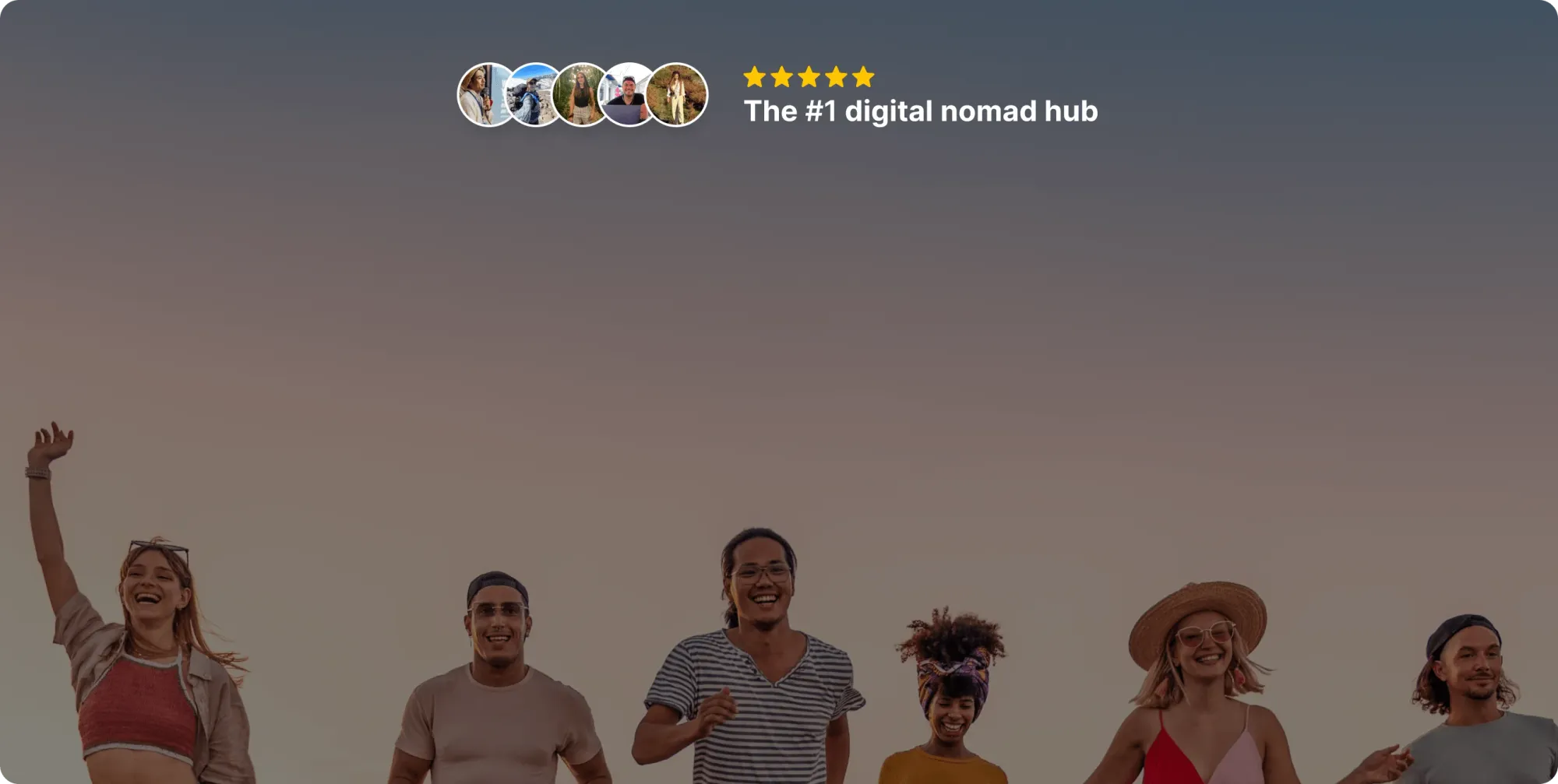Norway Digital Nomad Visa: How to Apply and Costs
Learn how to apply for the Norway Digital Nomad Visa. Requirements, process, and tips for remote workers and digital nomads.


Norway is ranked among the happiest countries in the world, and it’s easy to see why. Imagine finishing your workday with a hike with a fjord in the background, or sipping a kokekaffe (traditional Norwegian brewing method) in a minimalist coffee shop surrounded by mountains. For digital nomads looking for a mix of nature, safety, and work-life balance, Norway is the place to go.
When I first looked into staying here long-term while working remotely as a digital nomad, I was surprised when I found out that Norway doesn’t have a digital nomad visa per se. But the good news is Norway’s Independent Contractor Visa works almost exactly like one, and it’s designed for self-employed professionals.
In this guide, I’ll walk you through how Norway’s Independent Contractor Visa works, who it’s for, how to apply, whether it’s worth it, and what life really looks like here.
Quick Visa Facts
Visa validity period
Up to 2 years, renewable
Extendable?
Yes, renewable if requirements are still met
Who can apply?
Self-employed professionals or freelancers working for clients abroad, with at least one Norwegian client
Minimum income requirement
€36,000/year (approx. USD $38,000)
Application cost
€600 (approx. USD $650)
Processing time
Around 2–4 months, depending on location
What Is the Norway Digital Nomad Visa?
Norway doesn’t have a dedicated Digital Nomad Visa like other countries. However, for EU or EEA citizens, you can live and work in Norway without a permit.
For non-EU citizens, you can apply for the Independent Contractor Visa if you’re self-employed. This remote work visa allows you to live in Norway while working for yourself or clients based outside the country, but you do need at least one Norwegian client.
This digital nomad visa lets you live and work remotely from Norway for up to 2 years, with the option to renew. What makes it appealing is that it’s more than just a legal permission to stay: you can apply for permanent residency after 3 years, and even citizenship after 7 years, as long as you meet language and integration requirements.
Who Can Apply for the Norway Digital Nomad Visa?
If you’re self-employed and work with clients or businesses based outside of Norway, you can qualify for Norway’s Independent Contractor Visa. It’s perfect for freelancers, consultants, entrepreneurs, independent creatives, or anyone running their own business remotely.
It lets you do almost everything a regular digital nomad visa would: live and work remotely from Norway, and even apply for permanent residency later.
To apply, you’ll need to meet a specific minimum income, a valid health insurance that covers you for the whole duration of your stay, a contract with at least one Norwegian client, and other requirements.
You can also bring your spouse and children under 18 years old. They can live in Norway, but if your spouse decides to work, they will need a separate work permit.
Norway’s Visa Options for Remote Workers
Norway offers a couple of different visa options for digital nomads.
Starting with the D Visa, this is a temporary entry visa for people waiting for residency approval. It’s not meant for remote work, but it can help later if you transition into a longer permit.
Additionally, Svalbard has its own visa-free policy, but it’s not very practical for most digital nomads since it’s an Arctic archipelago close to the North Pole, and housing can be expensive.
How to Apply for the Norway Digital Nomad Visa
Applying for the Independent Contractor Visa in Norway isn’t complicated, and the whole application process is online:
Step 1: Gather the required documents
Before you begin your application, make sure you have all the necessary and up-to-date documents. You can find the list of main documents in the section below.
Step 2: Fill out the online application form
Go to the Norwegian Directorate of Immigration (UDI) website and complete the online form. You need to create an account and log in to start the application. Make sure to double-check every entry and upload all the documents that are listed on the UDI checklist.
Step 3: Print and sign the UDI Checklist
Once your application form is complete, print the UDI checklist generated online. Sign it and add it to your list of documents.
Step 4: Submit your application
You can submit your application in Norway or abroad:
- If you’re already in Norway, you can submit your application at a local police station, as long as you can prove that you’re staying legally (on a valid visa or permit).
- If you’re applying outside of Norway, book an appointment at your nearest Norwegian embassy or consulate. Some embassies or consulates may ask for additional paperwork.
Step 5: Attend the visa appointment
At your appointment, bring your passport and all the required documents.
Step 6: Wait for your application decision
Once submitted, the waiting time depends on your location. You’ll be notified by the embassy/consulate, and you can check for updates on your UDI application portal.
Required Documents for Norway Digital Nomad Visa
The required documents you will need for your online visa application are the following:
- A valid passport and a copy of all used pages in the passport
- A recent passport-size photo with a white background
- Proof of accommodation in Norway (rental contract, housing agreement, etc.)
- Proof of self-employment with a business established abroad (document that shows your sole proprietorship, it can’t be a limited company)
- Proof of funds showing annual income of at least €36,000
- Your academic background (diploma and transcripts)
- Your CV and work experience background (work certificates)
- A contract between you and the Norwegian client (your payments need to be equal to or higher than the minimum for skilled workers)
- The signed signature form from the Application portal (or application form)
- The UDI's checklist (filled out and signed)
- €600 application fee (payable online or at the embassy/consulate)
- Documentation showing you have held a residence permit for the last 6 months in the country you are applying from (if you’re applying in a country different than your home country)
- Documentation showing that you are in Norway legally (if you’re applying in Norway)
Remember to bring all original documents and copies to your appointment. All documents need to be in English or Norwegian.
How Long You Can Stay and What It Costs
This remote work visa allows you to live and work in Norway for up to 2 years. After that, you can renew it if you still meet the requirements, mainly by maintaining your income and proving your business is still active.
If you end up falling in love with Norway and want to stay, you can even apply for a residence permit after 3 years, and eventually citizenship after 7 years.
Regarding costs, the application fee is €600, and you’ll need to demonstrate an annual income of at least €36,000, approximately.
Why Choose Norway as a Digital Nomad
Consistently ranking as one of the happiest countries in the world, Norway is one of the best destinations for digital nomads and remote workers. The country boasts a high quality of life: the air is clean, cities are safe, and even in cities like Oslo, you are just a quick train ride away from amazing nature and wildlife.
People here genuinely value work-life balance, respecting working hours, and with offices tending to empty early. It’s pretty common to see people doing fun activities after work, including hikes and saunas. If this is something you truly value, you can also consider Finland as your next digital nomad destination, which is said to have an even better work life balance!
English is also widely spoken, which makes it easy to find community and connect with expats. And what really stands out is how peaceful Norway feels since it’s a place where you can focus on your work and still have time to relax and enjoy life.
Challenges to Keep in Mind
Although Norway seems like a dream digital nomad destination, the cost of living in Norway for digital nomads is pretty high, especially when it comes to housing, eating out, and transportation. Even groceries can be expensive, so you’ll need to be careful and budget accordingly.
You’ll also need to consider the long, cold, and dark winters. It can take some time to get used to the limited daylight in this season. On the flip side, you’ll probably see some amazing northern lights!
Last but not least, the remote work visa process can be a bit tedious. It’s slower compared to other countries that do have dedicated digital nomad visas (and they can even be warmer and cheaper!). But if you’re organized and patient, it’s completely doable, and the reward will be living in one of the safest, most beautiful countries in the world.
Taxes and Legal Considerations
Knowing your tax obligations as a digital nomad in Norway is very important. Remote workers under the Independent Contractor Visa will have to pay taxes in Norway. The income tax is around 22% of your yearly income for residents, and you’ll need to apply for a VAT (value-added tax) number.
That said, check your own tax status before moving, ideally with a professional who understands how Norwegian taxation works.
Best Places To Live in Norway for Remote Workers
Norway has some amazing places that are ideal for digital nomads, from urban coworking destinations to the most gorgeous nature escapes. Here are a few recommendations to base yourself as a remote worker:
- Oslo: Norway’s capital is modern, creative, and surprisingly green. It has a cool coworking scene, efficient public transport, and lots of cozy coffee shops where you can work for hours. Perfect if you want to strike a balance between city living and easy access to fjords.
- Bergen: Known as the “Heart of the Fjords”, Bergen has a laid-back vibe and colourful wooden houses that seem straight out of a fairytale. It’s a great choice for those who want to be closer to nature but still have the comfort of a city.
- Trondheim: The big little town has so much to offer. It’s smaller than Oslo but offers a young, tech-driven crowd, and a strong sense of community. Oh, and the food scene? Trust me, it’s as vibrant as its landscapes.
- Tromsø: If you’re all about adventure (don’t forget to get your digital nomad health insurance!) and don’t mind the cold, Tromsø is your place. Located right above the Arctic Circle, you’ll see the most stunning northern lights in winter and have endless daylight in summer.
Ready to Live in Norway as a Digital Nomad?

Join our global
digital nomad community
Join us for free
Freaking Nomads is supported by you. Clicking through our links may earn us a small affiliate commission, and that's what allows us to keep producing free, helpful content. Learn more
Read Next


Albania Digital Nomad Visa: Requirements & Application Guide


Malta Digital Nomad Visa: Everything You Need to Know

